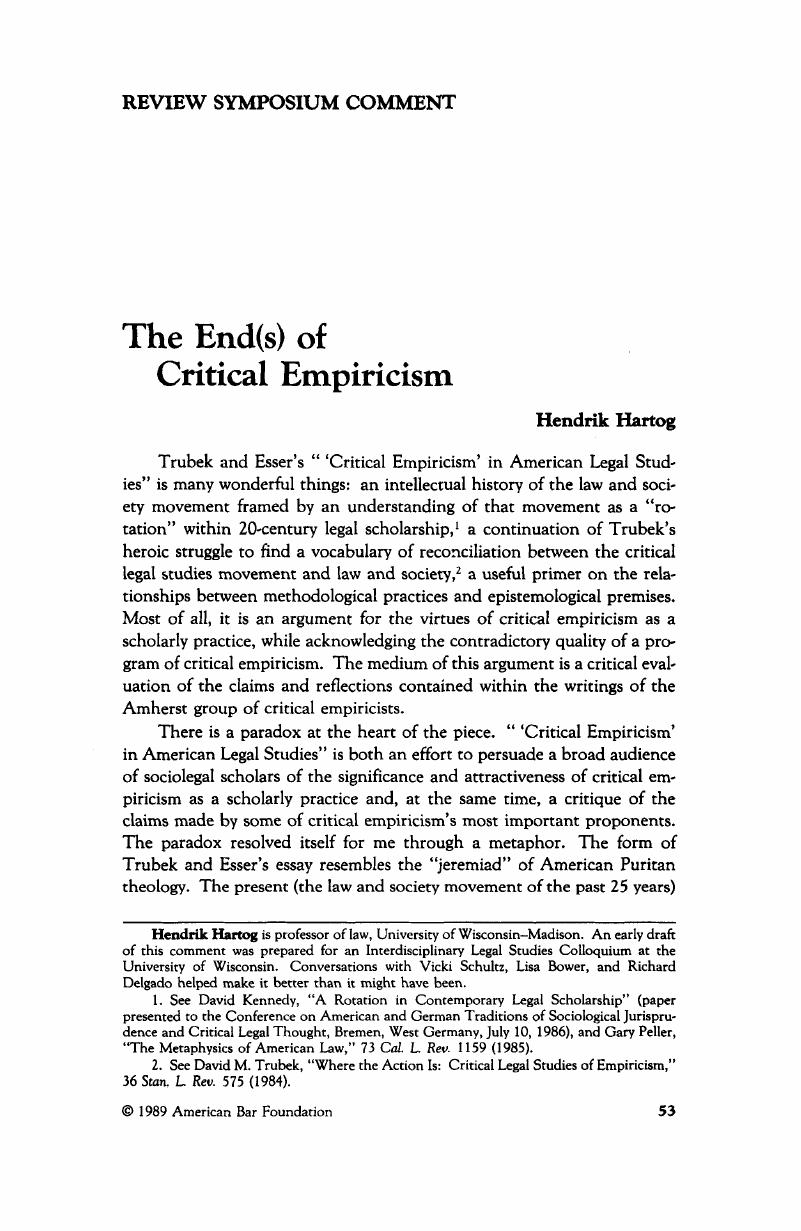No CrossRef data available.
Article contents
The End(s) of Critical Empiricism
Published online by Cambridge University Press: 27 December 2018
Abstract

- Type
- Review Symposium Comment
- Information
- Copyright
- Copyright © American Bar Foundation, 1989
References
An early draft of this comment was prepared for an Interdisciplinary Legal Studies Colloquium at the University of Wisconsin. Conversations with Vicki Schultz, Lisa Bower, and Richard Delgado helped make it better than it might have been.Google Scholar
1 See David Kennedy, “A Rotation in Contemporary Legal Scholarship” (paper presented to the Conference on American and German Traditions of Sociological Jurisprudence and Critical Legal Thought, Bremen, West Germany, July 10, 1986), and Peller, Gary, “The Metaphysics of American Law,” 73 Cal. L. Rev. 1159 (1985).CrossRefGoogle Scholar
2 See Trubek, David M., “Where the Action Is: Critical Legal Studies of Empiricism,” 36 Stan. L Rev. 575 (1984).CrossRefGoogle Scholar
3 See Perry Miller, The New England Mind: From Colony to Province 27–39, at 33 (New York, 1961): [There is] one technical problem inherent in the convention: the jeremiad could make sense out of existence as long as adversity was to be overcome, but in the moment of victory it was confused. It had always to say that now the day of trouble may be ended, that God has thus far” answered us by terrible things in righteousness”–if only our sins do not again undo us. It flourished in dread of success; were reality ever to come up to its expectations, a new convention would be required, and this would presuppose a revolution in mind and in society.Google Scholar
4 There is indeed something rather odd about a sequence of writings that begins with the various pieces of the Amherst Seminar and ends with this comment. First the Amherstians (notably Sarat and Silbey) write repeated methodological essays about the failure of sociolegal research to produce substantive scholarship that challenges dominant perspectives. Then Trubek and Esser write of the Amherstians' failure to produce” a scholarly article that explicitly champions a specific marginalized group.” Now I write about the failure of Trubek and Esser to produce a substantive paradigm. How long can this go on?Google Scholar
5 Matt. 10:34, The New English Bible: New Testament (Oxford and Cambridge, 1961).Google Scholar
6 A different, more pragmatic critique than the one dominant in Trubek and Esser's essay would insist less on the incompleteness of the Amherstians' critical stance and more on the significance of residual epistemological commitments for their empirical practices. Such a critique might demonstrate the normative and analytic costs of residual scientism. Such a critique would, however, require a shift away from programmatic statements and toward close examination of empirical practices, an examination not found in Trubek and Esser's essay.Google Scholar
7 A somewhat different response would note that neither Trubek and Esser nor the members of the Amherst Seminar offer much in the way of positive methodology, certainly nothing on the order of a recipe book of how to do critical empiricism. Instead, we learn a great deal about what to avoid–about the epistemological blinders and hidden commitments of mainstream scholarship. That may be, for the reasons developed in Trubek and Esser's work, as much as we can hope for given the paradoxical quality of critical empiricism. It still seems a bit like reading a health food cookbook that spent many pages on the evils of animal fats and coffee but never told the reader what he or she really ought to do with all that tofu.Google Scholar
8 Fineman, Martha, “Dominant Discourse, Professional Language, and Legal Change in Child Custody Decisionmaking.” 101 Harv. L Rev. 727–74 (1988).CrossRefGoogle Scholar


